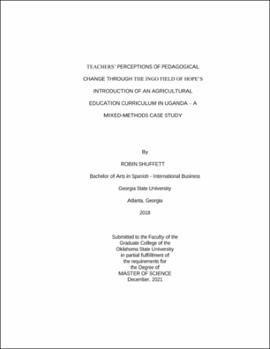| dc.contributor.advisor | Edwards, M. Craig | |
| dc.contributor.author | Shuffett, Robin | |
| dc.date.accessioned | 2023-04-12T19:38:40Z | |
| dc.date.available | 2023-04-12T19:38:40Z | |
| dc.date.issued | 2021-12 | |
| dc.identifier.uri | https://hdl.handle.net/11244/337381 | |
| dc.description.abstract | Agricultural education should provide practical experiences for school-aged youth to learn, interpret, reconceptualize, and apply such while acquiring the technical skills needed to successfully practice agriculture (Barungi et al., 2016; Mukembo, 2014, 2017). Initiatives from national agencies have been supported by international donors to optimize pedagogical change in secondary schools that transforms agricultural theory into agricultural practice in Uganda and elsewhere. This study featured the initiatives set forth by the U.S.-based, international nongovernmental organization (INGO), Field of Hope (FoH), which released an agricultural education curriculum for lower secondary grades S1-S4 in Uganda to be taught in concert with its national curriculum (Cannon, 2019; Major, 2018). A critical case sampling method was employed in this study. 56 teacher participants were chosen based on having had neither prior exposure to FoH’s curriculum nor experience with their training workshops. The survey questionnaire responses of these agriculture teachers were selected for analysis, including selected pre- and post-training observations. The study’s findings, including seven emergent themes and 21 related subthemes, indicated predominately positive attitudes regarding FoH’s agricultural curriculum and the professional development supporting its use, as well as teachers’ desires for continuous training. These findings supported and affirmed previous studies done on FoH’s curriculum and teacher training workshops (Cannon, 2019; Thurmond, 2019), as well as further validated and expanded on such due to this study’s sample of newly attending teachers. Based on the teachers’ critiques of the curriculum and their perceptions regarding future implementation, FoH should review the curriculum’s scope and content to condense it to address the respondents’ concerns regarding time constraints presented by their schools’ class schedules. Expanding FoH’s training services to include school administrators may also facilitate the teachers acquiring more support and resources for teaching agriculture, as well as their school leaders understanding that agriculture is an important course for students to study and a potentially fruitful career for many to pursue as a future livelihood. | |
| dc.format | application/pdf | |
| dc.language | en_US | |
| dc.rights | Copyright is held by the author who has granted the Oklahoma State University Library the non-exclusive right to share this material in its institutional repository. Contact Digital Library Services at lib-dls@okstate.edu or 405-744-9161 for the permission policy on the use, reproduction or distribution of this material. | |
| dc.title | Teachers' perceptions of pedagogical change through the INGO Field of Hope's introduction of an agricultural education curriculum in Uganda : A mixed-methods case study | |
| dc.contributor.committeeMember | Henneberry, Shida | |
| dc.contributor.committeeMember | Norwood, Bailey | |
| dc.contributor.committeeMember | Robinson, J. Shane | |
| osu.filename | Shuffett_okstate_0664M_17514.pdf | |
| osu.accesstype | Open Access | |
| dc.type.genre | Thesis | |
| dc.type.material | Text | |
| dc.subject.keywords | agricultural education curriculum | |
| dc.subject.keywords | international nongovernmental organization | |
| dc.subject.keywords | project-based learning | |
| thesis.degree.discipline | International Agriculture | |
| thesis.degree.grantor | Oklahoma State University | |
